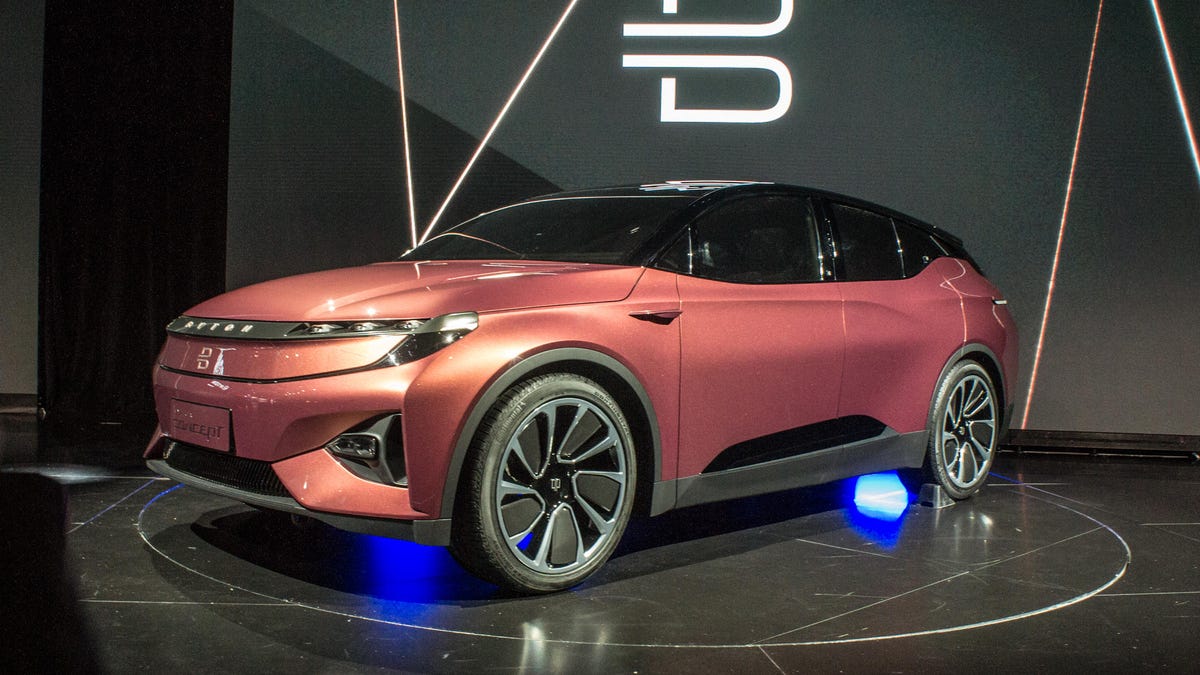Byton's CES concept car looks destined for the high-tech road
Combining all of the next decade's hot technologies, the new car introduced by startup Byton looks like something we will eventually drive.

If you could create a car from a blank slate, picking and choosing all the technologies likely to be relevant in the next decade, you would come up with something similar to the concept car startup Byton just introduced at CES 2018.
It's electric, of course, can drive itself, connects to the internet through 5G, uses Amazon Alexa as a virtual assistant, and can even recognize its driver and passengers through facial recognition.
And while you'll find many of these features on any vaporware concept car, Byton has a concrete timeline for production, and even a price target. Headquartered in China, Byton will launch its first car there in late 2019, followed by US and European launches in 2020. Byton expects to sell the car for about $45,000.
The advent of modern electric vehicles created something of a Wild West in the automotive industry, allowing for the rise of well-funded startups. Tesla is the premier example. Byton looks to be on solid footing, as it boasts headquarters in Nanjing, an investor office in Hong Kong, a design center in Munich and a software development facility, including autonomous driving, in Silicon Valley.
Byton says its new car was designed from the ground up to be electric. That means no spaces for internal combustion engine components. At CES, Byton said the car will come in two flavors, one with a 71 kilowatt-hour battery pack good for 250 miles, and a second with a 95 kilowatt-hour battery pack that can go 325 miles.
Fast charging capability will give it 150 miles range in 20 minutes, although most charging will likely be from 220-volt Level 2 stations.
Self-driving is a major part of Byton's plans. The company emphasized that the new car will give passengers time that would otherwise be spent gripping the steering wheel in the daily traffic jam. At launch, Byton is planning Level 3 self-driving, which means the car can drive itself in many situations, but in some the human driver will need to take over.
Byton calls the large LCD across the dashboard the Shared Experience Display, as all passengers will be able to see it. When the car becomes fully autonomous, this display can show entertainment as well as driving information.
The car will be technically equipped for Level 4 self-driving, which means it can handle all driving tasks. That capability will require a change in the law to be allowed on public roads.
Byton eventually plans to equip the car with a 5G data connection, although at launch it will likely have to settle for 4G. Flat antennas integrated into the roof handle data, and do away with the need for the shark fin-style antenna seen on most cars today.
That data connection will power the car's virtual assistant, which will be Amazon Alexa. In a demo video at the launch, Byton showed how passengers could ask Alexa for a navigation destination and fill out a shopping list.
To take advantage of future self-driving capabilities, the car will have swivel-mounted front seats, which can turn around so all passengers can face each other.
Byton included a touchscreen in the middle of the steering wheel, letting the driver input destinations and interact with the car.
Byton designates the concept as an SUV, although it is a little lower at the roofline than typical SUVs. Because of the electric platform on which it's built, Byton announced it will also look at producing a sedan version, and an MPV, or multipurpose vehicle, a type found in regions other than the US.
Given Byton's apparent backing and production timeline, this concept looks more like a prototype, something we're likely to see come to market.
Hyundai FCEV: We tackle 240 desert miles from LA to Vegas in Hyundai's new fuel cell prototype.
CES 2018: CNET's complete coverage of tech's biggest show.

